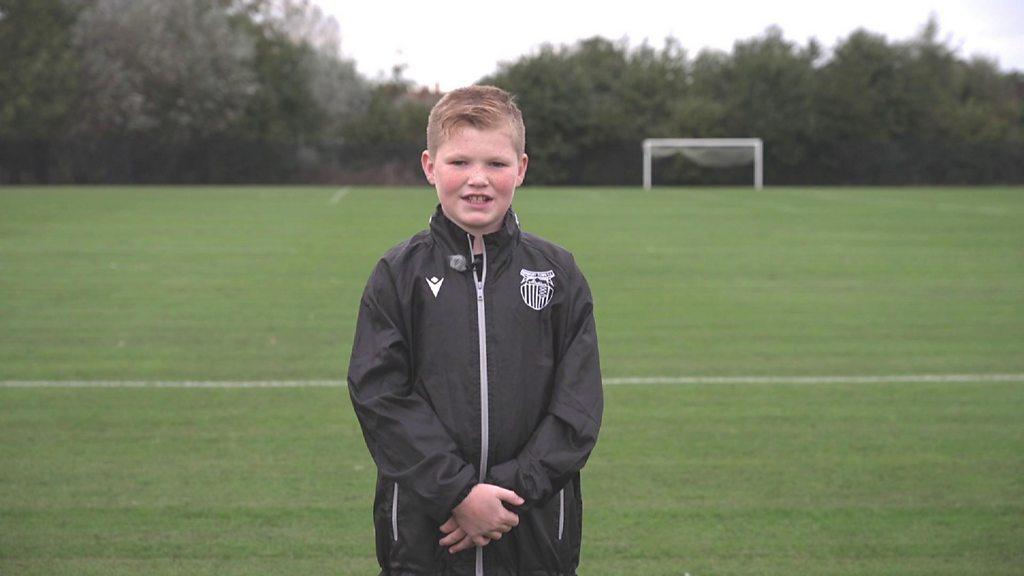How assistance dogs can make a big difference at university
- Published
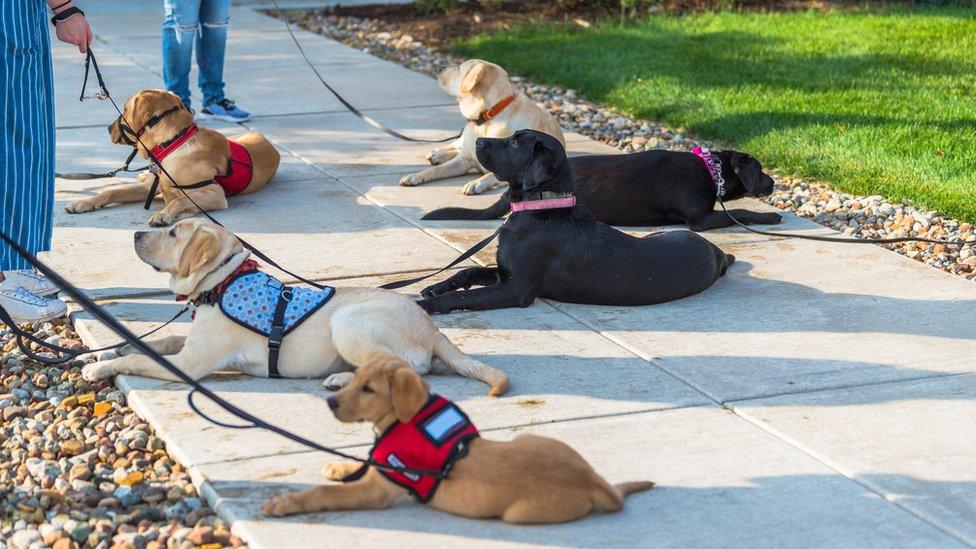
Assistance dogs can prove invaluable for students who need support navigating university
Packing for university does not usually involve dog treats, leads and poo bags, but for students within the UK's growing 7,000-strong assistance dog community, these are essentials.
BBC Young Reporter Competition winner Millie is raising awareness about the vital support these dogs offer as well as the challenges faced. It comes after Millie's plans to experience freshers' year with the canine support of Reggie ended when he did not pass the training.
Here, they share their story and speak to two students who have experienced campus life with their dogs.

I'm Millie. I'm 19 and my dog Reggie changed my life.
I'm autistic and live with chronic pain and anxiety. This means going out in public can sometimes be overwhelming, but Reggie made me feel a lot more confident in public spaces and kept me calm in times where I could struggle, such as on transport.
Realising the lack of reliable assistance dog information during college, at 16 I created an online info hub called Cate UK, external to fill the gap and help others.
Allow X content?
This article contains content provided by X. We ask for your permission before anything is loaded, as they may be using cookies and other technologies. You may want to read X’s cookie policy, external and privacy policy, external before accepting. To view this content choose ‘accept and continue’.
Social media has been a blessing and a curse, fostering community and awareness but also spreading misinformation.
The public often do not understand the difference between guide dogs and assistance dogs, who help with a wider variety of tasks and disabilities.
There is also a lack of clarity over legal guidance, training standards, and funding, leaving owners protected but lacking a formal definition under the Equality Act. Equalities and Human Rights Commission guides, external are the most detailed available.
This confusion can also affect how universities interpret the law, and spark lengthy misunderstandings with students.

Assistance dogs - a quick guide
Anyone can train an assistance dog, and the UK does not have a register or certification process for the animals
An assistance dog is generally considered fully trained when it helps the handler manage their disability, is toilet-trained and behaves calmly in public, without roaming freely
Under the Equality Act 2010, service providers - which include businesses and universities - cannot discriminate against individuals with highly trained assistance dogs, and must make reasonable adjustments to allow access
Landlords must accommodate disabled tenants with assistance dogs and cannot charge extra for them

The cost of training means there is a huge shortfall in the sector, causing long waiting lists. For instance, of the 7,650 inquiries the Autism Dogs Charity received in 2022,, external it only placed 18 dogs.
This is why I and many others turned to training our own dogs. I worked with an online trainer, as well as in-person and group classes. Reggie got most of it fine, but struggled to control his barking and, despite our best efforts, ultimately we ran out of time.
I spent well over £1,000 in training costs, but the emotional toll was worse. When you spend time training a dog and they help you so much with your independence, it can be a devastating blow to lose that. It has taken me months to get over the feeling of guilt that I let him down.
Reggie is still with us, just as a pet and is still a complete goofball. I still love him completely.
I've loved my first term studying electrical engineering at York University and managed to cope in my own accommodation, but still hope an assistance dog may join me in the future.

Morgan and Sabbath - studying veterinary medicine and surgery at Harper and Keele Veterinary School
Morgan, 21, lives with anxiety and several health conditions, including chronic fatigue and Tietze syndrome - a rare inflammatory disorder causing chest pain.
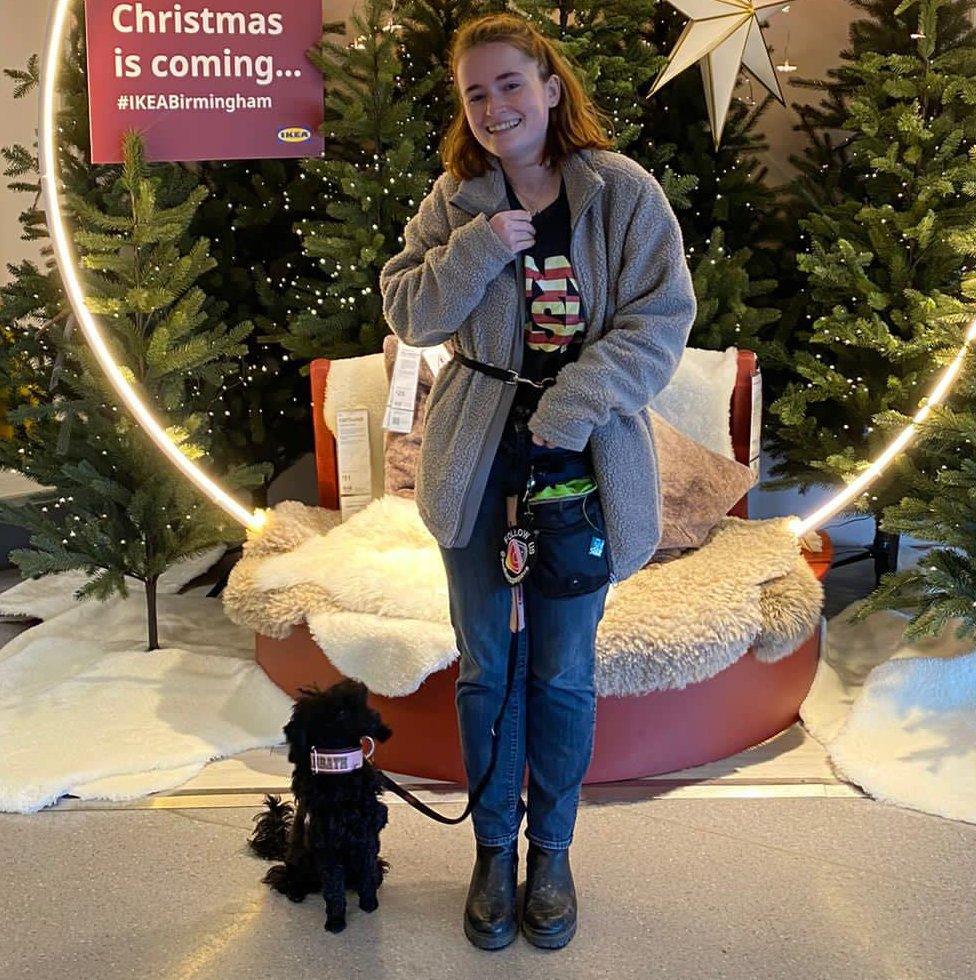
Morgan and Sabbath
My health issues began at home and worsened during college. As a fresher, I tried to hide them, because back then I worried about being known as the sick or disabled person.
But by the second year, the combination of extreme fatigue, pain and regular fainting episodes led to me falling behind with work, causing a breakdown.
Thankfully I was able to resit the year and did well. During this time I also began looking into assistance dogs.
My first dog, Orla, was self-trained, but despite our strong bond, obedience became an issue. It was heartbreaking, but I had to find her a new home. Luckily, she is now with a wonderful family, and I can still visit her and receive updates.
A few months later, I met my current dog Sabbath and we have successfully managed to partner for this academic year.
The university has been supportive. Before allowing Sabbath to attend with me they required a minimum obedience level from her, which we demonstrated by our Kennel Club Good Citizen (bronze award).
As she is still young, we are continuing obedience training to prepare for her public access test, usually taken by assistance dogs at 18 months old. Our goal is for her to achieve the gold Kennel Club award.
These courses are not legally mandated, but are widely accepted.
Sabbath will not grow much bigger since she is a toy poodle, but she does not let size hold her back.
Her impact on my routine has been huge - she stops me spiralling and has massively boosted my university attendance. I have also gained confidence in leaving the house knowing she is there.
Daily tasks include reminding me to take anti-inflammatories, to alerting me to oncoming Tietze attacks and fainting episodes. She can also perform deep pressure therapy, using her body weight to slow my heart rate and avoid meltdowns.
I do wake up an hour earlier for Sabbath's morning walk, meaning there is no jumping out of bed 10 minutes before a lecture! She stays with me for all lectures, seminars and most practicals, except dissections and farm practicals, when I leave her in a kennel. Lunch gives her some relaxation time and a toilet break.
Students and staff know about Sabbath's role and how to act around her, and everyone has been fantastic on campus. They respect her more than the general public, who often try to pet her even when she is working, wearing a clearly-signed harness. I never feel embarrassed or nervous walking around my university, it is amazing.
Placements have been a little more challenging. Assistance dogs are very rare in my field and although Sabbath has transformed uni for me, more awareness is needed in wider society.
Jessie and Oscar - graduated in graphic illustration from Winchester School of Art
Jessie, 24, uses a wheelchair and lives with anxiety and chronic pain.
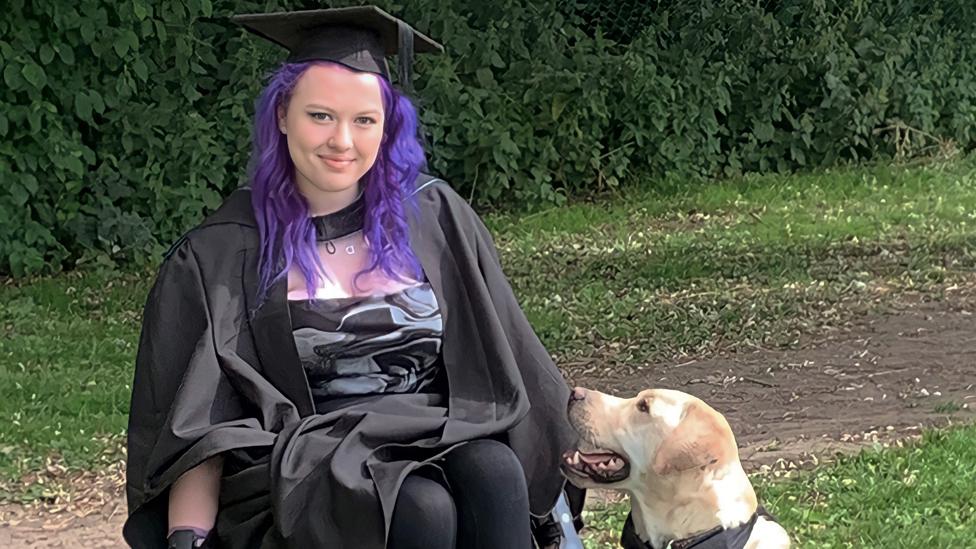
Jessie and Oscar at their graduation
I have been partnered with Oscar, a yellow Labrador paired through charity Canine Partners, for over a year - he joined for my final year following a medical deferral.
I was originally due to top a waiting list in 2020, but Covid shut everything down. Looking back I am glad it did because Oscar, who was too young then, is now my perfect companion.
That is not to say the first few months together were easy - being responsible for another life on top of heading back to uni did feel overwhelming at times, but the benefits both physically and mentally made every tough moment worth it.
As a wheelchair user, Oscar's physical help eased the strain, from opening doors to helping me pick up dropped items or remove my coat. However, it was his emotional support that really changed things for me. I went from avoiding having to speak in front of people, to enjoying preparing for talks because he made it less scary by distracting me or licking my hands as comfort.
For my final project I decided to raise awareness of assistance dogs by illustrating a book from Oscar's perspective, talking about some of the tasks he does for me, what his favourite things are (mainly cheese) and showing his little oddities that make him special to me.
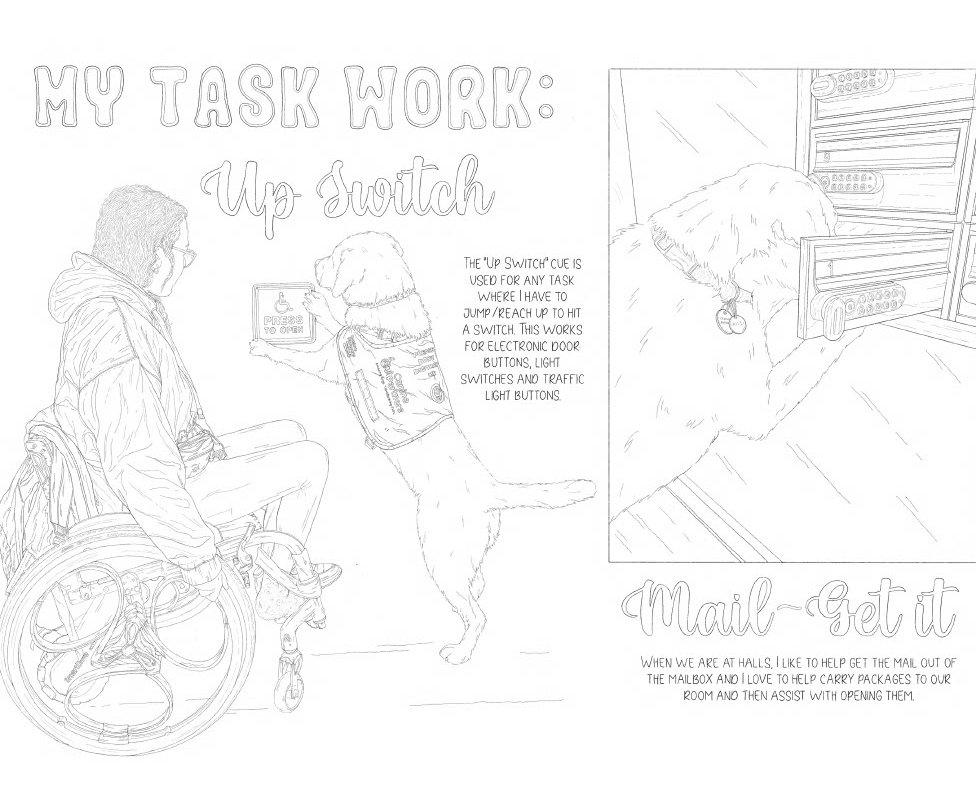
A page from Jessie and Oscar's graphic illustration book explaining his tasks and the world through his eyes
I am really proud of the response - people said it opened their eyes and hopefully it helped to educate.
By the end of the year, Oscar changed what was often a difficult experience into such a special time - walking the stage with him at graduation was one of the most special moments in my life.
Additional reporting by Alex Taylor
You can find stories by other young people on the BBC Young Reporter website
- Published22 July 2023
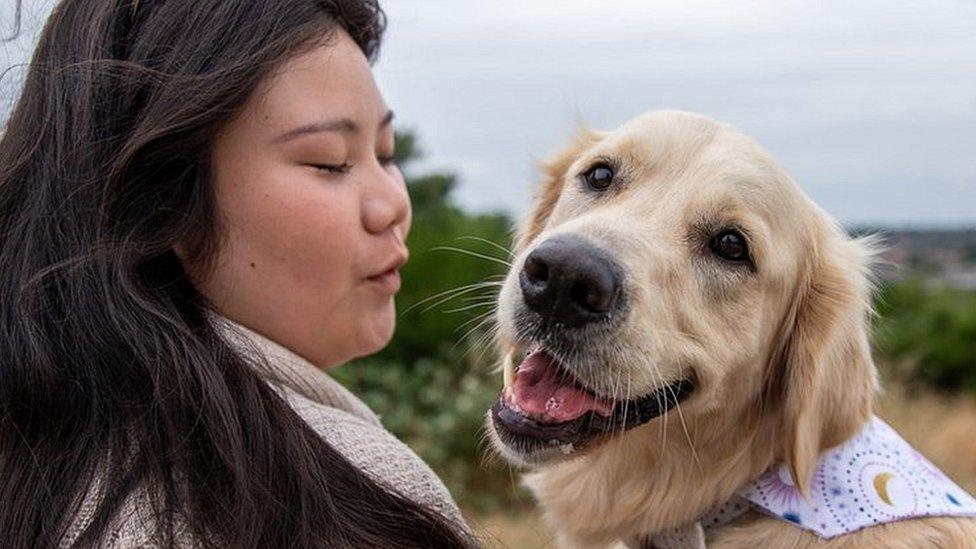
- Published3 March 2023
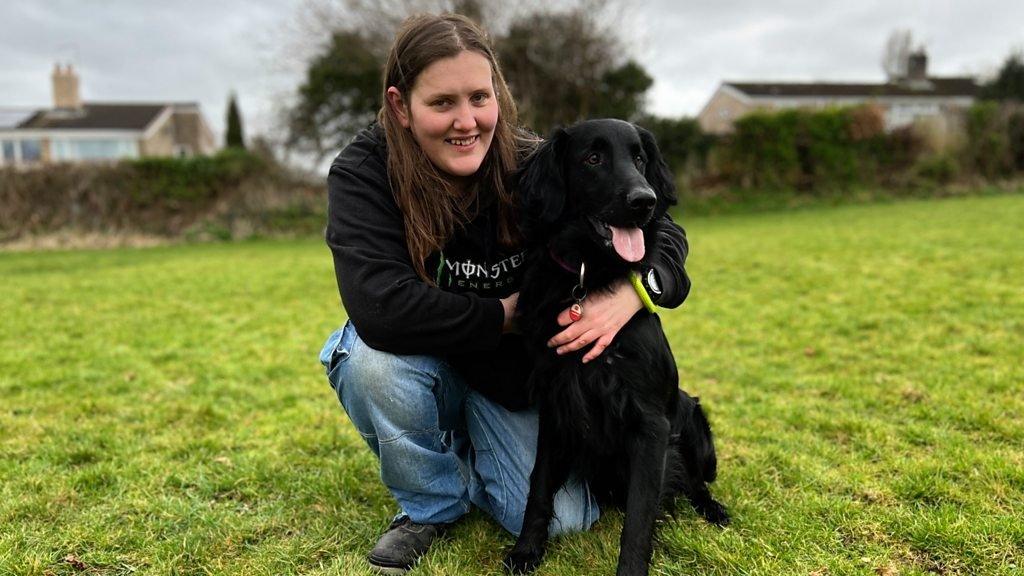
- Published21 November 2023
